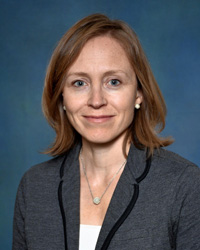Law professor part of program to give communities equal voice in switch to renewable energy
LAWRENCE — Researchers from the University of Kansas are part of a multi-institutional partnership to help ensure the United States’ ongoing transition to renewable energy and low-carbon technologies is just and provides equity and opportunities for communities on the front lines of the climate crisis.
The expansion of wind, solar, hydropower, biofuels and transitions to low-carbon technologies has not kept the pace needed to respond to the climate crisis. To respond to that need, as well as to provide equity for the communities in the path of climate change, the Alfred P. Sloan Foundation has awarded a three-year, $500,000 grant to researchers from KU, Barry University in Florida, the University of Minnesota, University of Richmond and Pennsylvania State University. The team will work with communities to design a framework for creating policies that mitigate the impacts of climate change for a more just transition to renewables, while expanding renewable energy production in the most vulnerable communities with environmental justice considerations.
The project, Just Energy Transitions and Place, will examine how place-based considerations should be incorporated in federal or state energy transition initiatives. Understanding unique local considerations such as extreme weather events, environmental and health impacts from the energy sector, political dynamics, tribal land dispossession, land loss and historical inequities will guide the research team in developing a framework based on a broad set of factors.
“All too often, planning takes place without enough input for the people who will be affected by it most, those who live every day in the communities that will be guided by new policy,” said Ward Lyles, associate professor of public affairs & administration at KU. “We are honored to be a part of this team that will give residents, planners, citizens and leaders the chance to truly work together to get to the heart of what is needed and what is the best way to compassionately implement energy transition plans in a way that best serves all involved.”
Uma Outka, William R. Scott Professor of Law, and Lyles are KU’s members of the research team. They will join co-principal investigators Nadia Ahmad, law professor at Barry University, and Elise Harrington, professor of public affairs at the University of Minnesota. The team also includes Danielle Stokes of the University of Richmond and Jennifer Baka and Hannah Wiseman of Penn State.
 Researchers will conduct interviews and focus groups in Kansas, Florida, Pennsylvania and Louisiana. Project funds will also be used to train and support graduate students from multiple institutions in law, public policy, urban planning and geography.
Researchers will conduct interviews and focus groups in Kansas, Florida, Pennsylvania and Louisiana. Project funds will also be used to train and support graduate students from multiple institutions in law, public policy, urban planning and geography.
“This project will make critical contributions to our understanding of how different communities across the country experience energy transitions. It will cover a diverse array of geographies, and this multidisciplinary team brings a wide range of expertise in conducting research that is locally oriented,” said Evan Michelson, program director at the Sloan Foundation.
The research will help build on the growing body of literature on energy transition policy by identifying opportunities for cross-state learning in policy design and areas where place-based context must be considered for effective and responsive policymaking. The engagement of communities through interviews and focus groups will ensure the research is connected to the lived experience of communities facing energy transitions.
Outka and Lyles previously collaborated to organize a conference at the KU Commons on the topic of “Finding Justice in the Low-Carbon Transition,” and Lyles is the director of the Center for Compassionate & Sustainable Communities at KU, with which Outka is affiliate faculty. Both have made significant contributions in energy, law, planning and justice as part of their research careers, as well as exploring how cities can switch to a low-carbon grid, corporate renewable energy pledges, how cities can effectively start adaptation to climate change and how compassion should be an essential part of public planning.
“We are looking forward to collaborating as an interdisciplinary team to learn as much as we can about how a rapid clean energy transition can serve local communities,” Outka said.